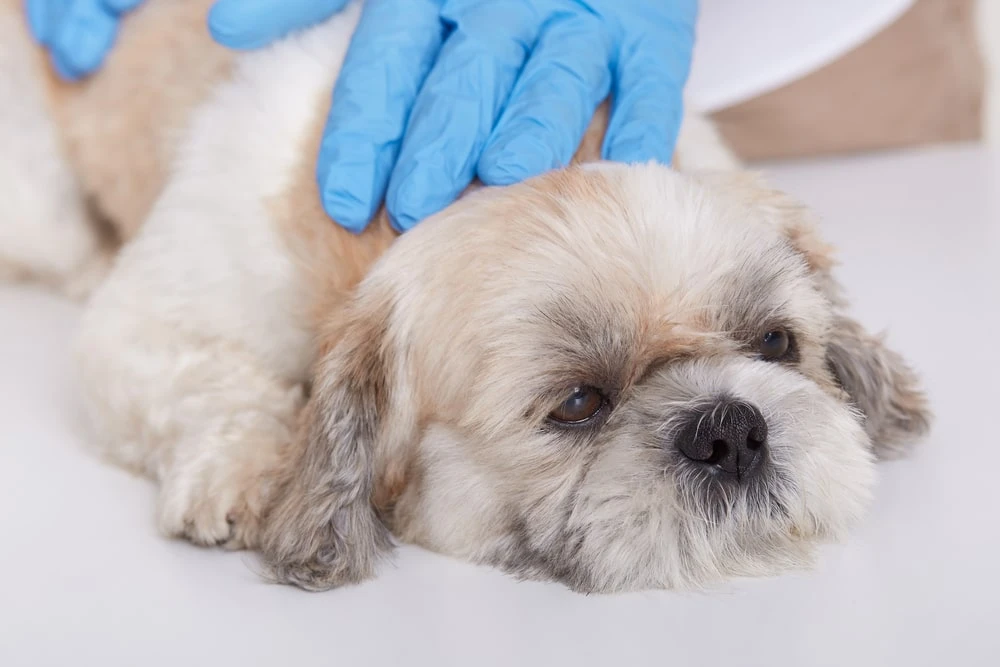PET HEALTH
Dog diarrhea has many causes — and it could get better on its own, or your dog may need a vet’s help. Let’s look at why your dog may be having diarrhea, when it’s a good idea to take them to the vet, and how you can treat your dog at home.
What Causes Diarrhea in Dogs?
Diarrhea is loose or unformed stool that happens when fecal matter moves too fast through your dog’s gastrointestinal (GI) system.1,2
Sometimes, diarrhea in dogs can be caused by something that only lasts for a short time, or it could be a symptom of an underlying condition. Some causes of dog diarrhea include:1,2
- Stress
- Foreign objects in the GI tract
- A change in diet or switching to new food too quickly
- Allergies or food sensitivities
- Intestinal parasites, bacterial and viral infections, or inflammation
- Ingesting something poisonous, toxic, or upsetting to your dog’s GI system
- Health conditions such as cancer, Addison’s disease, immune or pancreatic disorders, and liver or heart disease
The color, smell, frequency, and consistency of your dog’s stool can help your vet figure out what’s causing the diarrhea.2
A MetLife Pet Policy May Help Cover Dog Diarrhea Costs
When To Take Your Dog to the Vet
Many times, your dog’s diarrhea can resolve on its own. But there are situations when it’s a good idea to take them to the vet for medical care. If you notice any of these signs, you likely need to bring your dog to the vet:1,2
- Bloody or black stool
- Vomiting
- Weakness or lethargy
- Abdominal pain
- Fever
- Dehydration
- Lack of appetite
- Diarrhea that lasts for more than 2 days
You know your dog’s potty routine and what’s considered out of the ordinary for them. Some dogs may have sensitive stomachs and encounter frequent bouts of diarrhea, but are otherwise healthy. If you’re ever in doubt, talk with your veterinarian.
When is dog diarrhea an emergency?
Diarrhea that lasts more than a few days, vomiting alongside diarrhea, and bloody diarrhea are signs that should be taken seriously.1
Fresh blood — aka hematochezia — could mean something is happening in your dog’s lower digestive tract or colon.3 Older blood in their stool — aka melena — looks dark, sticky, and jelly-like.3 It could mean your dog is having upper GI tract issues caused by things like infection, inflammation, tumors, foreign objects, or trauma.1,3
Vomiting or long-lasting diarrhea could be due to an infection, toxicity, or illness that needs medical attention quickly.1,2
Dog Diarrhea Treatment
Before your vet can treat your dog’s diarrhea, they typically run diagnostics to find the cause. Depending on the severity, fecal tests, physical exams, blood work, ultrasounds, X-rays, and endoscopies may be used to help find the problem. Your vet will likely ask you to bring a stool sample to the appointment.1,2
Once the cause is determined, your vet will form a treatment plan. When dog diarrhea needs medical treatment, this can involve:1,2
- Medication to help with nausea, diarrhea, or vomiting
- Dewormer or antibiotics for parasites and infections
- Probiotics to help restore good gut bacteria
- Prescription dog food for GI health
- Hospitalization or intravenous (IV) fluids in more severe cases
- Specialized treatment for any underlying health conditions
For immediate relief, your vet may advise you to restrict your dog’s food for up to a day or feed them small meals that are easy on their stomach. It’s also important to keep fresh water readily available for them.1,2
What Can I Give My Dog for Diarrhea at Home?
If you’re wondering what home remedy you can give your dog for diarrhea, ask your vet — they may tell you to feed your dog a bland diet for a couple of days and keep a close eye on them.1,2 Foods that can help relieve diarrhea include:4
- White rice (you can also give them the water you boiled the rice in)
- 100% pumpkin puree
- Plain yogurt or low-sodium cottage cheese
- Plain, cooked chicken, eggs, or potatoes without the skin
You can slowly reintroduce their regular food once their stools start to firm up. This can look like a bowl with 25% of their normal food and 75% of the bland diet food for a day or two. Then, increase the normal food amount in their bowl every day or two until you work up to only their regular food in their bowl.1 Take it slow, and monitor your pup closely.
Can I give my dog Pepto-Bismol?
While certain over-the-counter (OTC) meds can help relieve your own stomach issues, they may not be safe for your dog. In general, it’s not advisable to give your dog Pepto-Bismol because the salicylates in it can lead to gastric bleeding.5 It’s also usually not recommended to give them Imodium since it can interact with medications they may be on.1,5
However, some dogs may be able to handle a very limited dose of them. Talk with your vet to see what they recommend based on your dog’s medical history.
Relieve the Discomfort of Vet Bills With MetLife Pet Insurance
If your dog has diarrhea but is acting normal, it could be that something upset their stomach and they’ll feel better after their body gets rid of it. But dog diarrhea with blood, vomiting, or lasting more than 2 days is usually worth a trip to the vet.
A dog insurance policy from MetLife Pet may help you relieve the financial discomfort that can come with surprise vet bills. Get coverage for exams, medications, and even prescription food to help treat diarrhea — like Mila, a dog from Illinois who needed diagnostics, IV fluids, and treatment for her diarrhea. With her MetLife Pet policy, Mila’s family was reimbursed nearly $1,250 on the $1,450 vet bill.6
Consider getting a free quote today to help you prepare for your dog’s future health needs.
Dr. Hunter Finn has been paid by MetLife to discuss the importance of choosing pet insurance. He is an integrative veterinary expert first, and social media star second. America’s favorite veterinarian owns Pet Method in McKinney, Texas, where he cares for pets while prioritizing their emotional well-being. When he’s not at his clinic, he’s starring in viral videos on TikTok (2 million followers) and Instagram (500K followers) — where he’s been known to snuggle puppies and conquer the latest dance trends.



